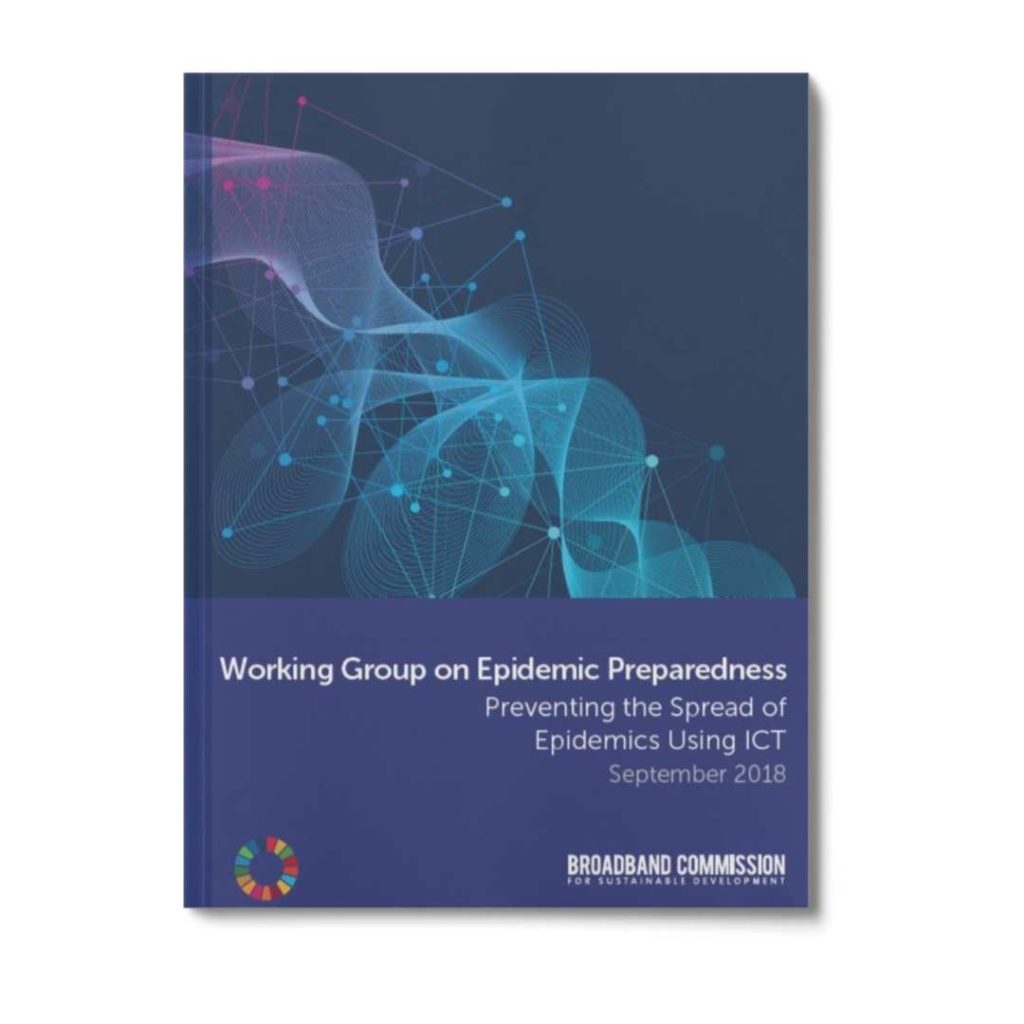How can ICTs help countries prepare for the next epidemic?
Chaired by Mr. Chang-Gyu Hwang, Chief Executive Officer of the KT Corporation, the Broadband Commission for Sustainable Development’s Working Group on Epidemic Preparedness was established in 2018 with the objective of providing analyses of the technical, regulatory, and institutional aspects of preventative measures and identifying best practices for managing epidemics.
The work of this group was continued through the Working Group on Epidemic Management in 2021. Click here to learn more.
Setting the Stage
The role of ICTs in responding to epidemics
Modern epidemics pose a great threat to humanity with their unprecedented speed and scale. In 2018, the economic loss of modern epidemics was estimated to be approximately 60 billion dollars per year. What is more concerning is that global changes have made it more difficult to address modern epidemics. Growing international exchanges since the 1970s, increase in population and urbanization, intensification of global climate and environmental changes, and inadequate systems of disease prevention and control are considered the leading causes of epidemics in modern society. Stakeholders from various fields around the world are addressing such challenges in an effort to free humanity from the threats of epidemics.
Information and Communication Technologies (ICTs) can play a pivotal role in making timely, high quality and reliable health information available during epidemic outbreaks. In an increasingly interconnected world, information communication technologies (ICT) play the role of a hub through which we share use cases and know-hows to fight epidemics throughout the world. Considering the nature of modern epidemics, which cannot be tackled by regionally fragmented responses, there is a strong need to build a united front at a global level to fight infectious diseases.
The Way Forward
Conclusions and Recommendations
The Working Group’s 2018 report, titled Preventing the Spread of Epidemics Using ICT, provides practical recommendations and best practice examples for how policymakers can use readily available and innovative ICTs to prevent the spread of epidemics such as SARS, MERS and Ebola. Additionally, the report provides guidance on realizing the political, technological, and structural cooperation that needed to successfully combat epidemics in today’s world.
Considering that the increased complexity of modern epidemics requires multi-faceted solutions, epidemics solutions that solely depend on big data might not be able to produce tangible and meaningful outcomes in the future. This challenge can be resolved by utilizing various ICT technologies in data collection and analysis, thereby lowering the dependency on a single source of data. The effort to fight epidemics is further evolving by using real data such as roaming data, social media and IoT in an effort to collect more practical data and to enhance the effectiveness of data analysis.
The key strategic recommendations of this Working Group’s report are:
Currently, many countries around the globe have privacy protection laws in place. However, this should not lead to the loss of opportunities to prevent the spread of epidemics in an early manner. Considering the fact that epidemics can harm not only individuals but also the public health as a whole, we could consider that relevant privacy laws enable the processing of public health data without consent in contexts where the processing is necessary to protect the public interest in the area of public health during epidemiological emergencies. In addition, we need to continue our efforts to create an environment where the use of personal information takes place in a safe and reliable manner.
Data sharing and utilization among nations around the world is essential to more effectively fight epidemics. Under the shared goal of epidemics eradication, governments around the world need to have a renewed perspective toward epidemics data sharing and make more concerted efforts in establishing a common system. In particular, active participation from Asia and Africa, which are often prone to epidemics, is required. However, some of the countries in those regions do not have enough resources and budget and lack technological infrastructures, thereby failing to operate the epidemics response system. Hence, it is the responsibility of the international community to think about how to best provide economic and technical support so that these regions in need can build an epidemics monitoring system.
There is a pressing need for the international community to actively collaborate in fighting epidemics. Private enterprises need to develop epidemics solutions based on their various ICT technologies and data, and nations around the world should pursue more open and integrated approach so that the data and solutions of private companies can be effectively shared on a single global system. At the same time, there is an increasing need for global governance to be jointly led by international organizations of various fields, such as UN, ITU, and WHO. Remaining tasks for international organizations now include the establishment of epidemics-related regulations and policy guidelines that governments around the world can refer to and the promotion of the private-public-international community participation to build an integrated system.
- ICT has been playing an essential role in preventing the spread of infectious diseases, and there are various examples that can prove this. Cases in point include the establishment of the Internet- based report network in the late 1990s and the identification of the course of epidemics spread by using big data and mobile devices during the SARS and the MERS outbreaks.
The Working Group Model
Composition and Activities

Mr. Chang-Gyu Hwang
Chief Executive Officer
KT Corporation
- FLACSO Argentina
- Government of Ethiopia
- GSMA
- Intel
- Kenya
- Malaysia
- Novartis Foundation
- Pakistan
- Rwanda
- UN Global Pulse
- UN Foundation
- ITU
- CITC
- Ericsson
- Safaricom
- World Bank
- WEF
- PAHO
- WHO
The Working Group was proposed during the annual Broadband Commission meeting held in September 2017.
Focus Area
Outcome Resources
Co-Chairs
Mr. Chang-Gyu Hwang
KT Corporation
Broadband Advocacy Targets
SDGs






